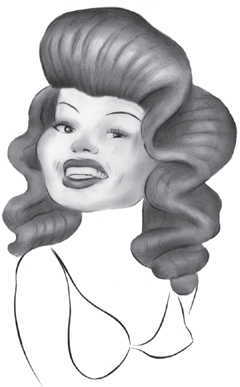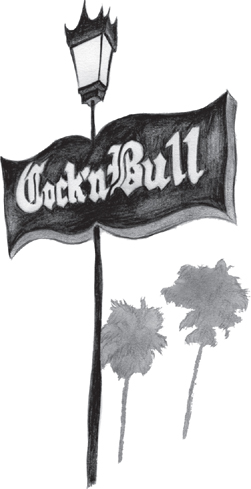

Reporter: “What do you look like when you wake up in the morning?”
Hayworth: “Darling, I don’t wake up till the afternoon.”
Iconic sex symbol of 1940s cinema, Rita Hayworth was nicknamed the “Love Goddess,” for her turn as the titular man-eater in Gilda (1946) and for her World War II negligee pinup photo in Life magazine. She was the first performer to dance with both Gene Kelly and Fred Astaire on film. Born Margarita Carmen Cansino in Brooklyn to a famous Spanish dancer and a Ziegfeld Follies chorus girl, Hayworth was discovered as a teenager while dancing with her father at the Caliente Club in Tijuana. She was signed to a six-month contract by Fox and snatched up soon after by Columbia. Following a long string of B-movies, she dyed her hair red and underwent electrolysis in an effort to look less “exotic,” adopting her mother’s maiden name for good measure. Fairly quickly, she landed a supporting role in Howard Hawks’s Only Angels Have Wings (1939) with Cary Grant. Hayworth would spend the next decade as the reigning female sex symbol of Hollywood. But despite box-office draw, she clashed with Columbia head Harry Cohn over her personal life. She was married and divorced five times; among her husbands was Orson Welles (her director on The Lady from Shanghai, 1947) and Prince Aly Khan. Supposedly shy and quiet off-screen, Hayworth, late in her life, summed up her romantic entanglements with a quip that might equally describe the final decades of her career, “Most men fall in love with Gilda, but they wake up with me.”
FOR RITA HAYWORTH, MEN and alcohol did not mix. And yet she loved them both in equal measure. It was thus she found herself at the Polo Lounge at around midnight entangled with yet another rotten husband (her fourth), the both of them royally smashed. That they were drunk had been obvious from the first mumbled “hello,” although playwright Clifford Odets would have assumed it regardless. For one thing, Odets never would have gotten a call from Rita Hayworth and actor/singer Dick Haymes had the couple not been deep in their cups. Especially after what had happened earlier that day.
You see, Odets was in Hollywood working on a film he wrote called Joseph and His Brethren. But he and the director had just spent the entire evening at Columbia Pictures waiting for their star, Hayworth, to show up. Eventually they went home, and now Hayworth was calling him from the Polo Lounge to ramble about her frustrations as an artist and actress and so on. Even worse, her meddling “manager” husband, Dick Haymes, equally drunk, was egging her on. Whatever his minor talents as an entertainer, Haymes was primarily known for being a major pain in the ass, a first-class interloper who’d chase successful actresses (he’d end up marrying six times) and then suck them into his own black hole of self-pity and booze.
Hayworth could not have stumbled into Haymes at a less opportune moment. She had just emerged from a disastrous marriage to Prince Aly Khan, which had further alienated Columbia head Harry Cohn (he owned her, goddamnit), and she hadn’t completed a movie in two years. Her sex-symbol status was fading, and her relentless partying was accelerating the aging process. In the year and a half they’d been married, Hayworth and Haymes had fallen into a pattern of staying up till the wee hours drinking and then sleeping until noon.
And Hayworth was not someone who could handle her liquor. Her behavior became erratic, her temper flared. She’d often insist on driving through the Hollywood Hills after drunken arguments with her previous husband Orson Welles, who feared she was intent on killing herself. Years later, her fifth and final husband, James Hill, said he’d seen the look Hayworth acquired when drinking only one other time in his life: “during the war, on a machine gunner carrying a Browning automatic.”
As for her then-husband, the Argentine-born Haymes, he could have used a porter for all the baggage he brought to the marriage. Nearly $200,000 in debt (a combination of unpaid taxes, alimony, and child support), he was facing deportation because he’d traveled to Hawaii (not yet an official state) without certifiable proof of American citizenship. (And also because, allegedly, Harry Cohn wanted him out of Hayworth’s life.)
But Joseph and His Brethren looked to be a turning point for both husband and wife—but more so for Haymes. Hayworth had recently renegotiated the terms of her contract with Columbia to include not only a $50,000 loan for her husband, but also his full access to the studio’s lot and an option on his services as a screenwriter. He’d also begun to manage his wife’s career. In fact, with the ridiculous notion of costarring alongside his wife in Joseph, Haymes had actually grown a beard.
Playing the biblical hero Joseph would have been deliciously ironic for a man that Confidential magazine had nicknamed “Mr. Evil,” but Haymes soon discovered that Columbia had not only cast a relative unknown in the part, but that Cohn had banned him from the set. Haymes was outraged. And now, at the Polo Lounge, he had a filmmaker’s ear one final time.
Grabbing the phone from his wife, Haymes accused Odets of not properly explaining the psychology of Hayworth’s part to her and of being in the studio’s pocket. He made veiled threats, then he hung up.
Her sex-symbol status was fading, and her relentless partying was accelerating the aging process.
The next morning, Haymes called Columbia and said Hayworth wouldn’t be coming in that day. A few days later, her lawyers informed the studio that because the picture hadn’t started on time, it was breach of contract, and she was owed her full $150,000 fee. The already-shot footage of Joseph and His Brethren went on the shelf. Two years later, Columbia severed its ties with Hayworth for good, replacing her with Kim Novak. Cohn, with his trademark cruelty, is reported to have said, “All you had were those two big things and Harry Cohn. Now you just have those two big things.”
Not surprisingly, her marriage to Dick Haymes was by this time long over. The final blow had been an actual blow. At the Cocoanut Grove on a similarly boozy night shortly after the Joseph incident, Haymes struck Hayworth in the face. She went home, packed her bags, and never returned.
THE CLOSEST THING Golden Age Hollywood had to a genuine English pub, the Cock ’n Bull opened on the Sunset Strip in 1937 and outlasted a full half-century’s worth of fly-by-night operations around it. Founded by Jack Morgan and managed by his family until 1987, it was adopted by such British expats as Richard Burton, Somerset Maugham, and Alan Mowbray, as well as Americans F. Scott Fitzgerald, Errol Flynn, Sinclair Lewis, John Carradine, and Robert Mitchum. Jessie Wadsworth, Hollywood’s first female talent agent, kept an office upstairs and generally ended her days at the bar. On one such occasion, Wadsworth was looking on as actor Sonny Tufts threw a punch at another patron, which accidently caught Wadsworth square on the jaw. Morgan kicked Tufts out and told him never to return. He was back a few weeks later. A real drinking man’s place, so sacrosanct was the Cock ’n Bull that it was where the Bundy Drive Boys gathered to mourn the passing of the great John Barrymore.
But the Cock ’n Bull’s greatest contribution to world culture was only tangentially related to its high-profile clientele. The joint served classic pub fare such as prime rib, Yorkshire pudding, and Welsh rarebit, but its signature drink was something of a curveball. (And, as these things often are, a happy accident.) According to head bartender Wes Price, Morgan—who by the 1940s was distributing his own brand of Cock ’n Bull ginger beer—found himself saddled with too many cases of Smirnoff vodka and a surplus of his own brew that would go bad if he couldn’t unload it. In a desperate bid to avoid pouring all this beautiful ginger beer down the drain, Price mixed the two ingredients, added lime, and served it up in a copper mug. Tough-guy character actor Broderick Crawford was the first customer to give it a try. He liked it. Had a bit of a kick to it. And with that, the Moscow Mule was born: “The Drink with the Velvet Kick.”
